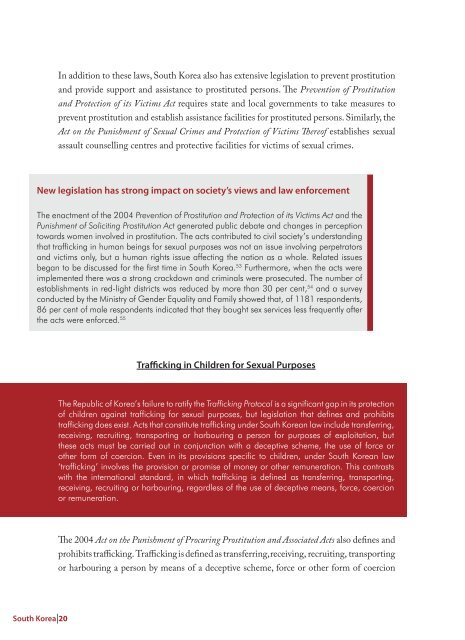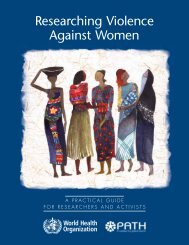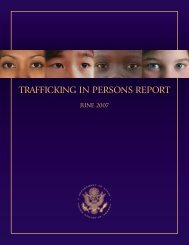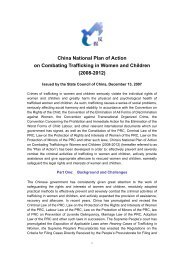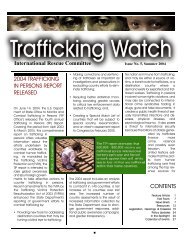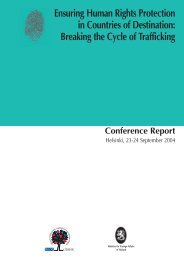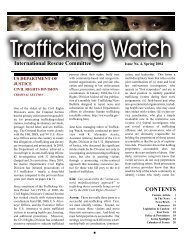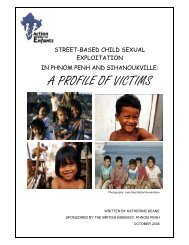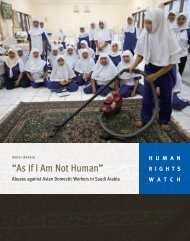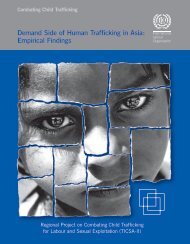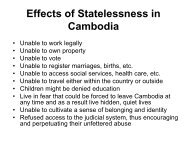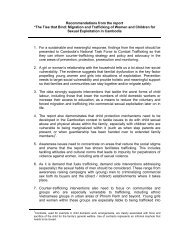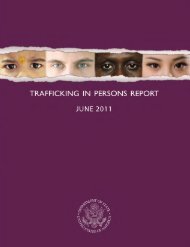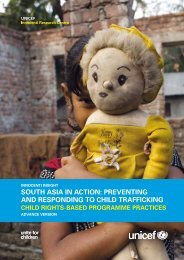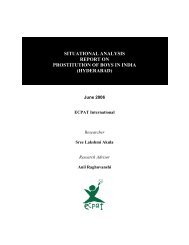South Korea - ECPAT International
South Korea - ECPAT International
South Korea - ECPAT International
Create successful ePaper yourself
Turn your PDF publications into a flip-book with our unique Google optimized e-Paper software.
In addition to these laws, <strong>South</strong> <strong>Korea</strong> also has extensive legislation to prevent prostitution<br />
and provide support and assistance to prostituted persons. The Prevention of Prostitution<br />
and Protection of its Victims Act requires state and local governments to take measures to<br />
prevent prostitution and establish assistance facilities for prostituted persons. Similarly, the<br />
Act on the Punishment of Sexual Crimes and Protection of Victims Thereof establishes sexual<br />
assault counselling centres and protective facilities for victims of sexual crimes.<br />
New legislation has strong impact on society’s views and law enforcement<br />
The enactment of the 2004 Prevention of Prostitution and Protection of its Victims Act and the<br />
Punishment of Soliciting Prostitution Act generated public debate and changes in perception<br />
towards women involved in prostitution. The acts contributed to civil society’s understanding<br />
that trafficking in human beings for sexual purposes was not an issue involving perpetrators<br />
and victims only, but a human rights issue affecting the nation as a whole. Related issues<br />
began to be discussed for the first time in <strong>South</strong> <strong>Korea</strong>. 53 Furthermore, when the acts were<br />
implemented there was a strong crackdown and criminals were prosecuted. The number of<br />
establishments in red-light districts was reduced by more than 30 per cent, 54 and a survey<br />
conducted by the Ministry of Gender Equality and Family showed that, of 1181 respondents,<br />
86 per cent of male respondents indicated that they bought sex services less frequently after<br />
the acts were enforced. 55<br />
Trafficking in Children for Sexual Purposes<br />
The Republic of <strong>Korea</strong>’s failure to ratify the Trafficking Protocol is a significant gap in its protection<br />
of children against trafficking for sexual purposes, but legislation that defines and prohibits<br />
trafficking does exist. Acts that constitute trafficking under <strong>South</strong> <strong>Korea</strong>n law include transferring,<br />
receiving, recruiting, transporting or harbouring a person for purposes of exploitation, but<br />
these acts must be carried out in conjunction with a deceptive scheme, the use of force or<br />
other form of coercion. Even in its provisions specific to children, under <strong>South</strong> <strong>Korea</strong>n law<br />
‘trafficking’ involves the provision or promise of money or other remuneration. This contrasts<br />
with the international standard, in which trafficking is defined as transferring, transporting,<br />
receiving, recruiting or harbouring, regardless of the use of deceptive means, force, coercion<br />
or remuneration.<br />
The 2004 Act on the Punishment of Procuring Prostitution and Associated Acts also defines and<br />
prohibits trafficking. Trafficking is defined as transferring, receiving, recruiting, transporting<br />
or harbouring a person by means of a deceptive scheme, force or other form of coercion<br />
<strong>South</strong> <strong>Korea</strong>|20


